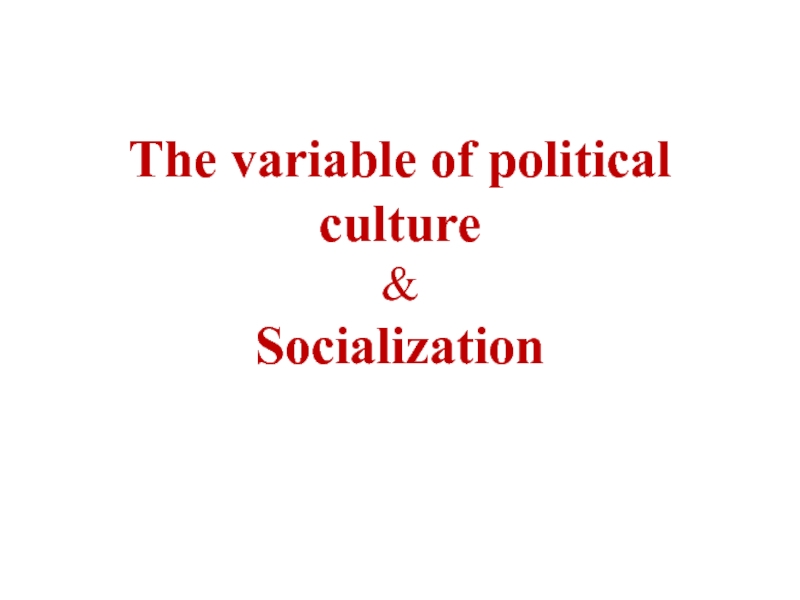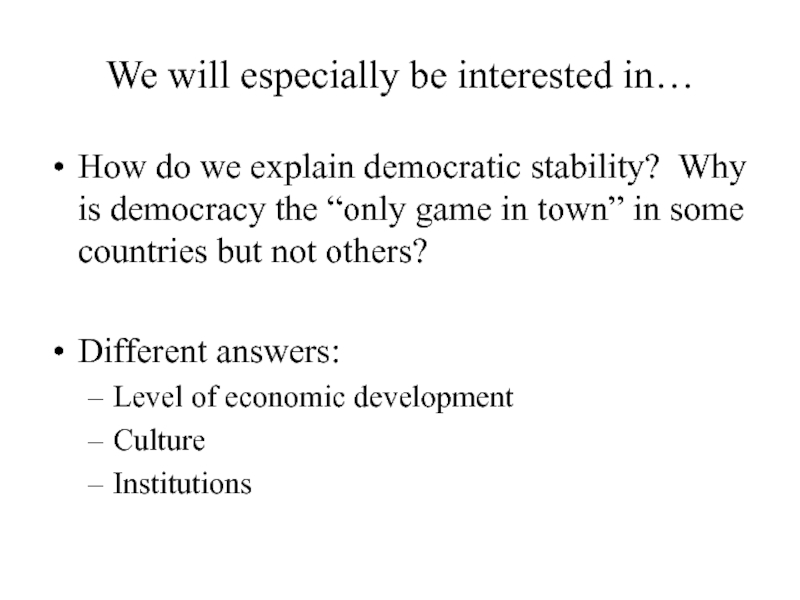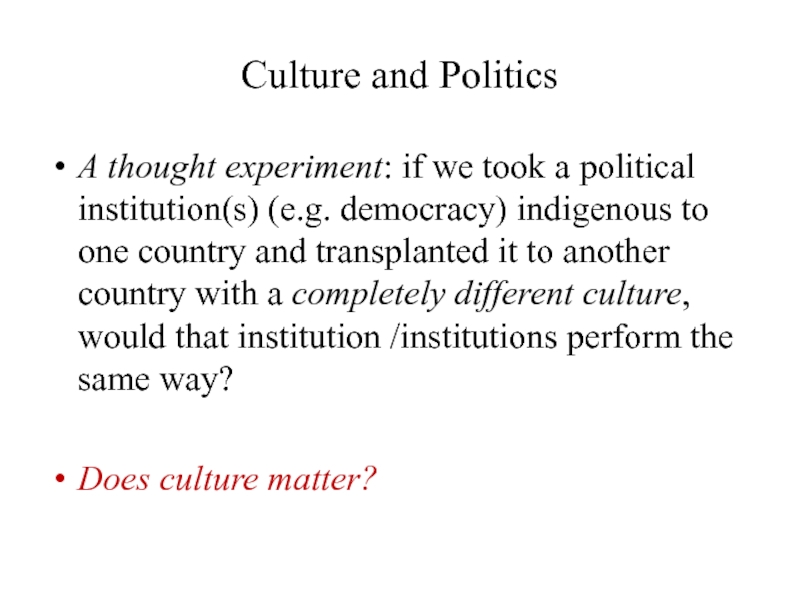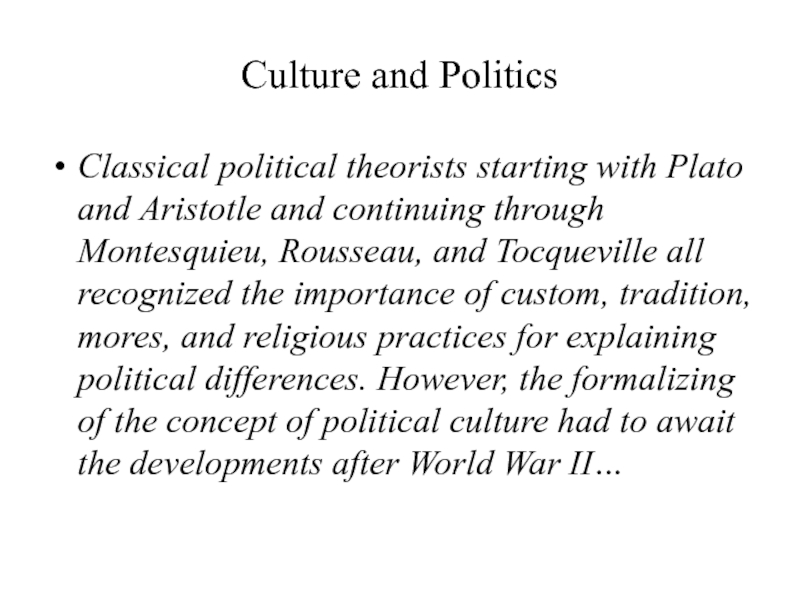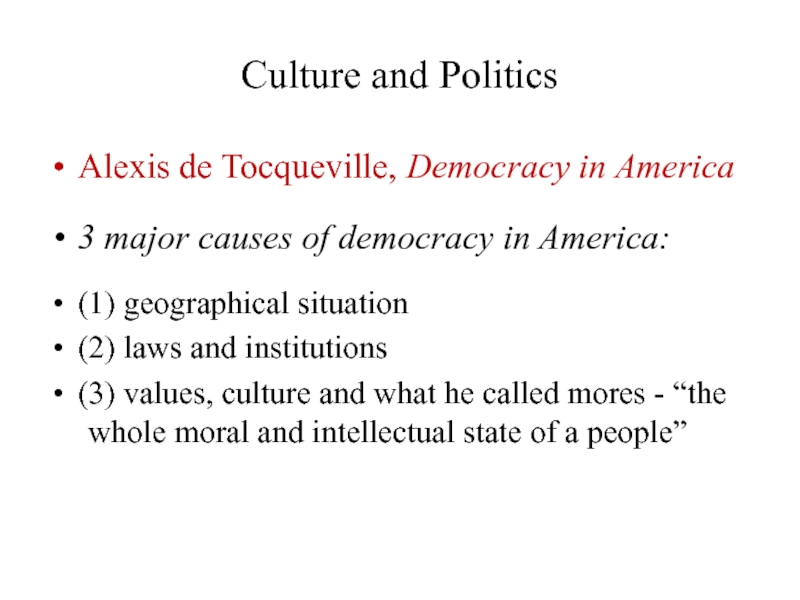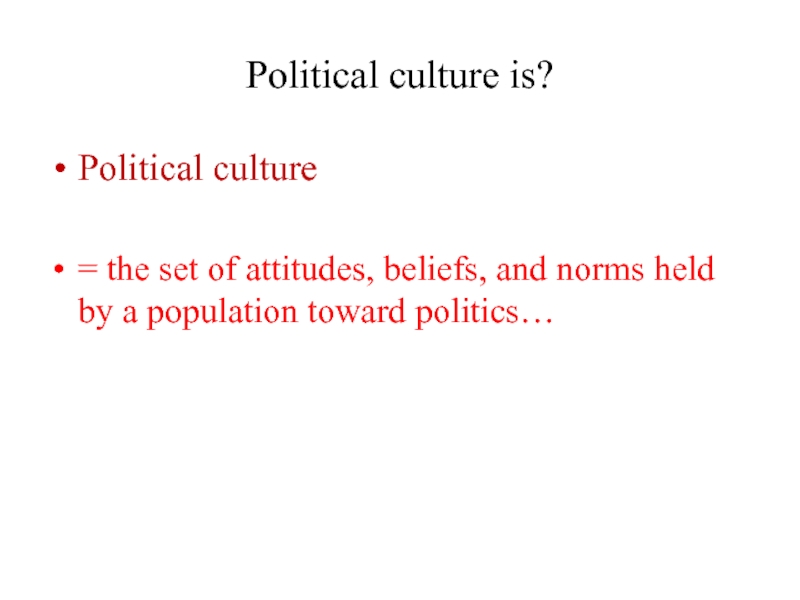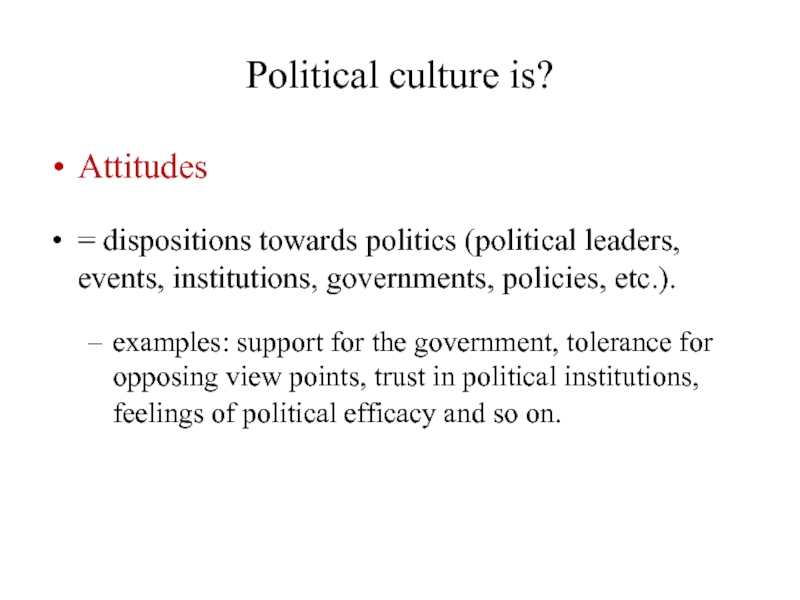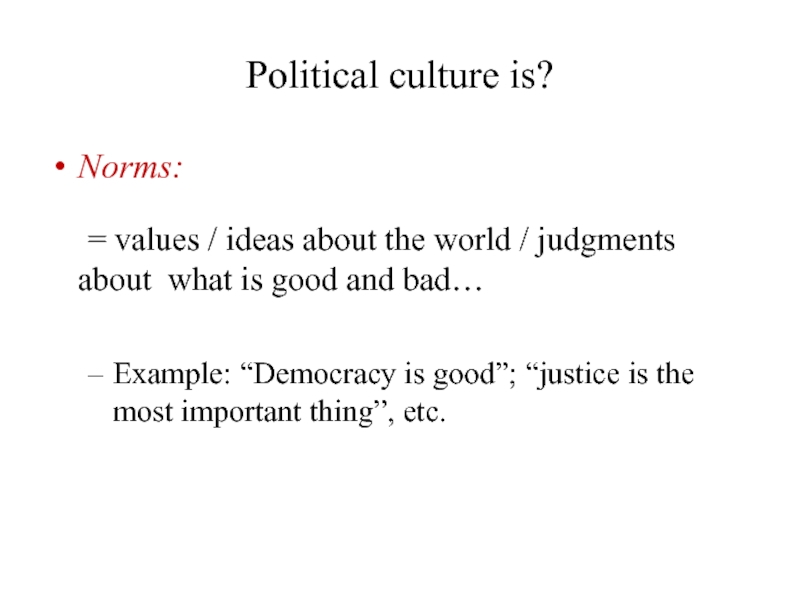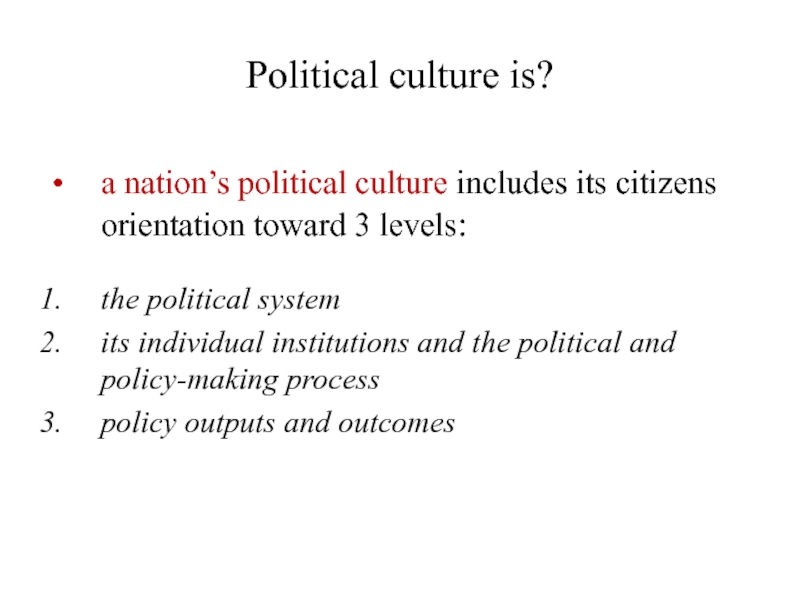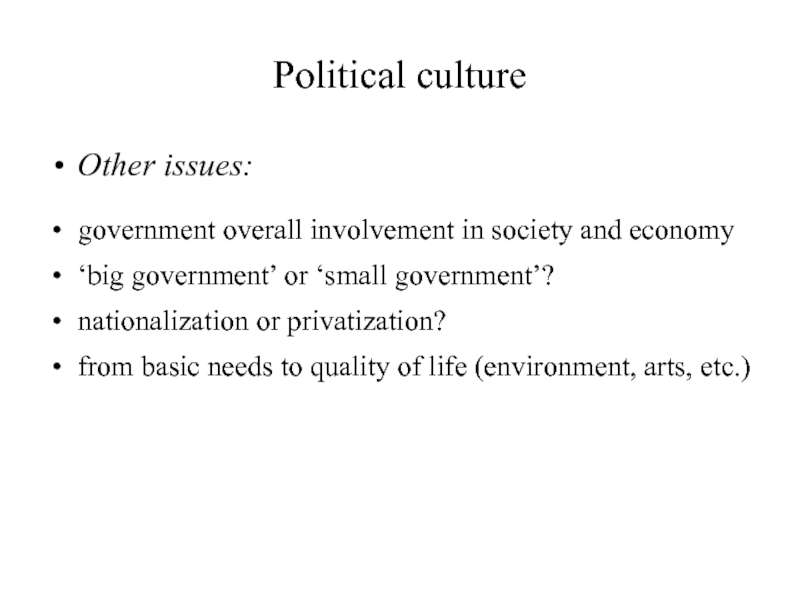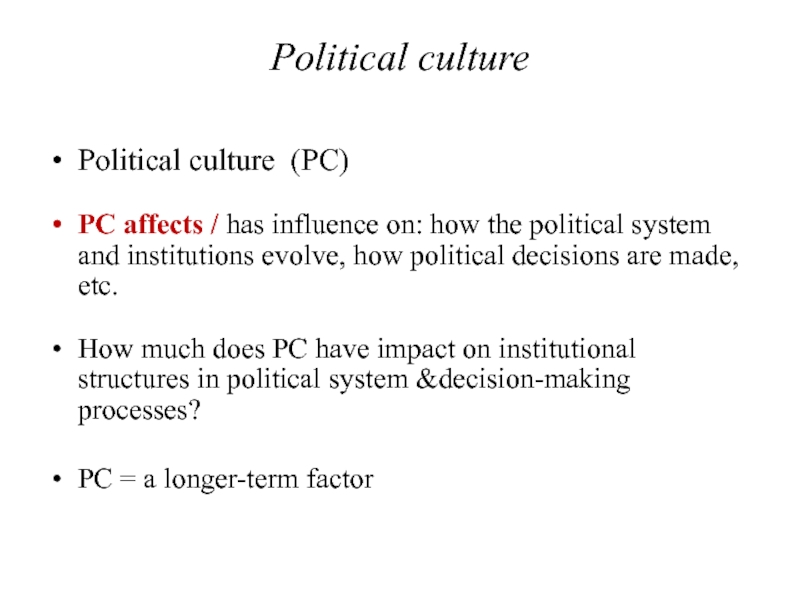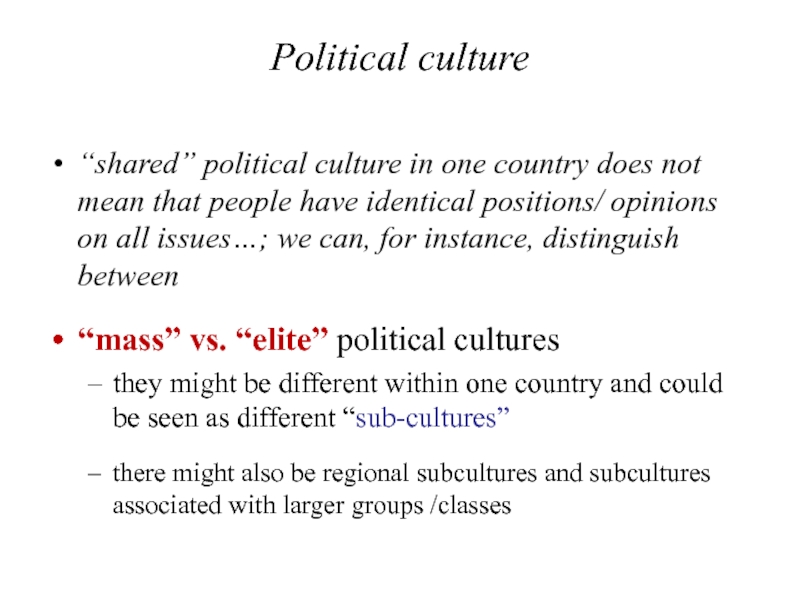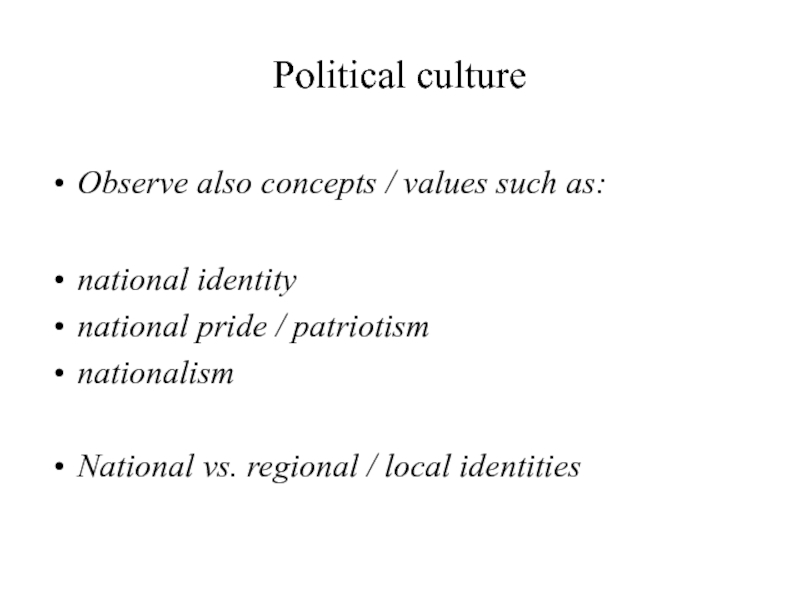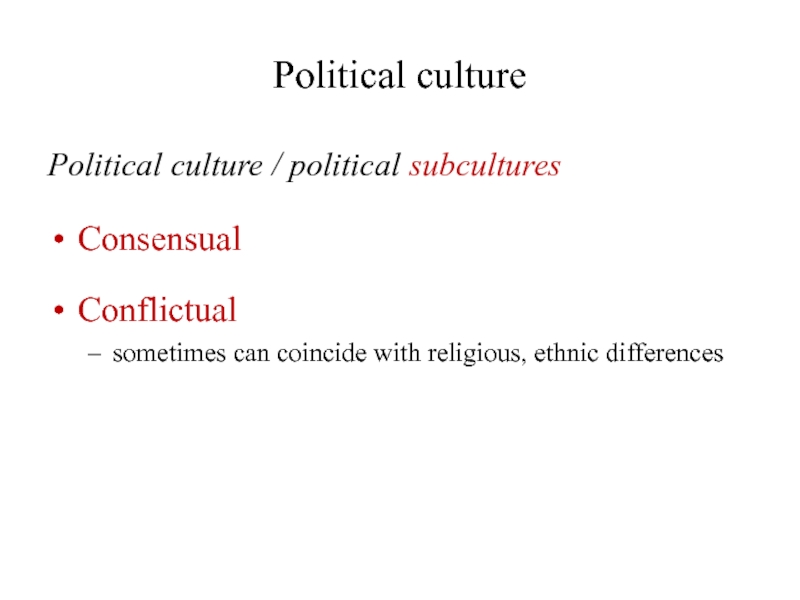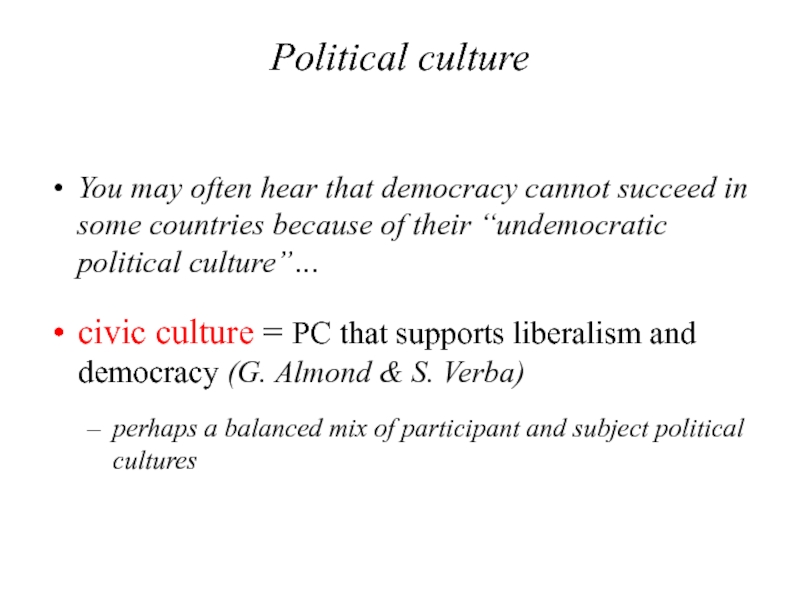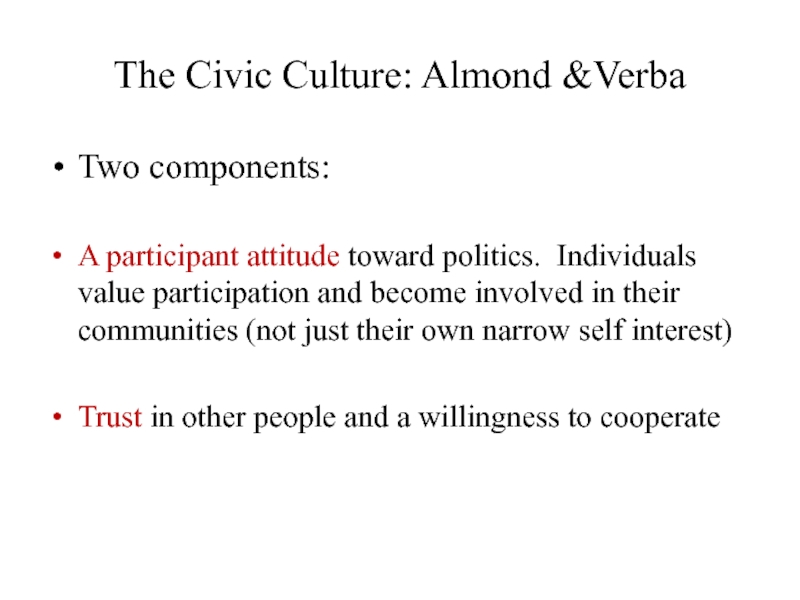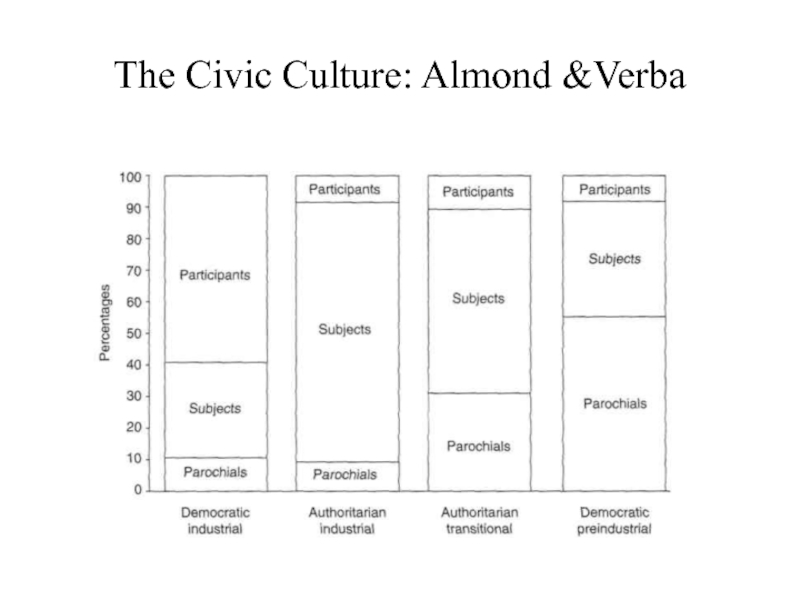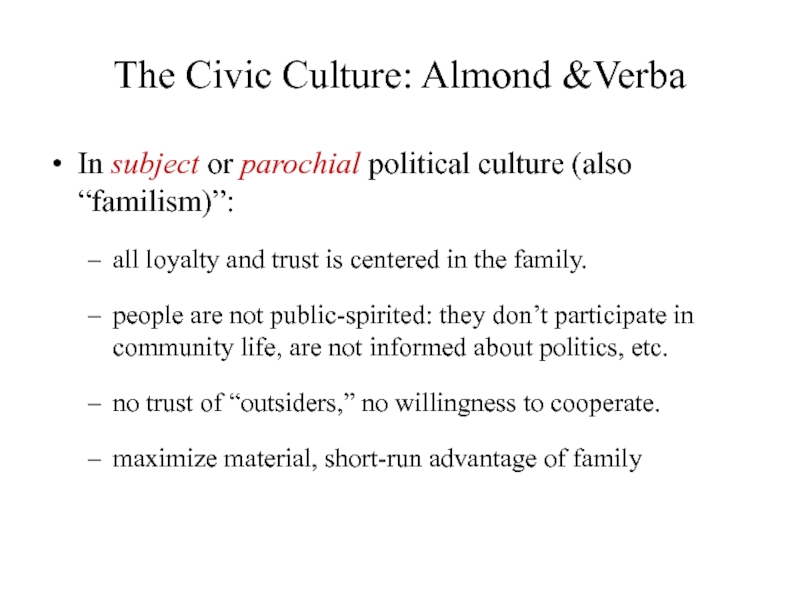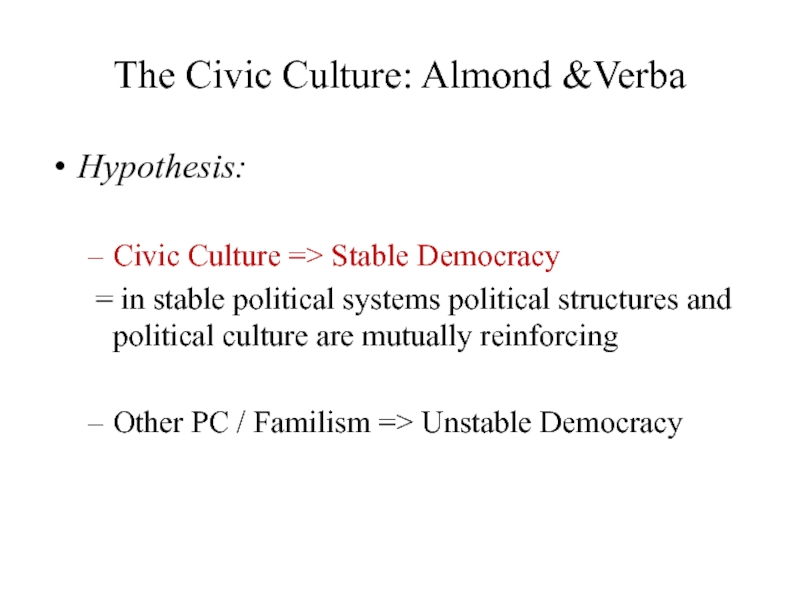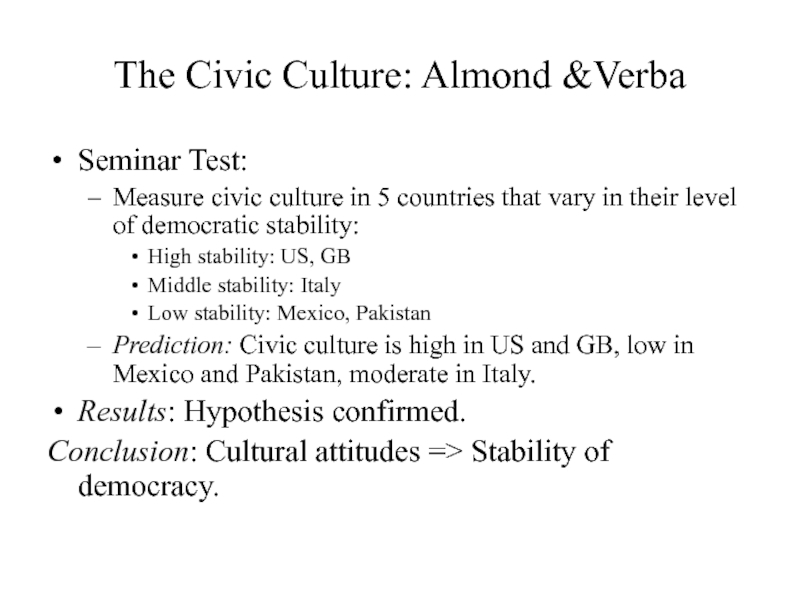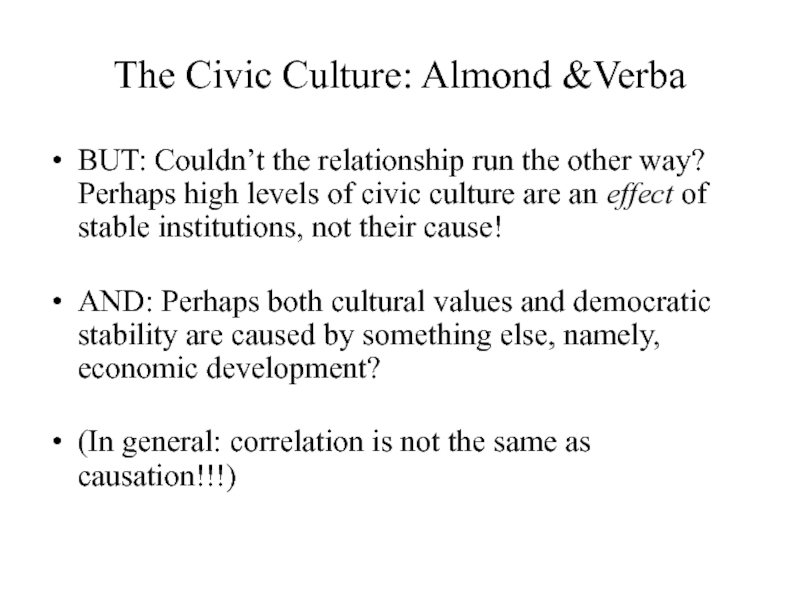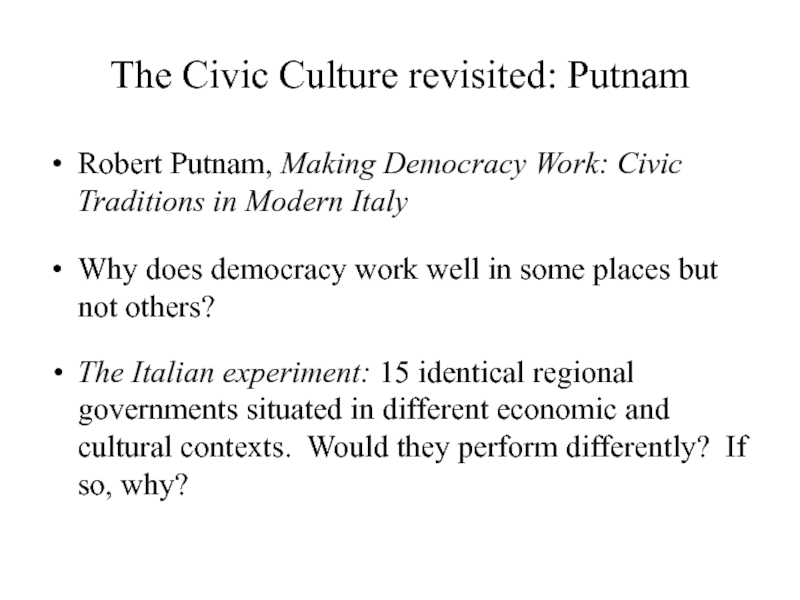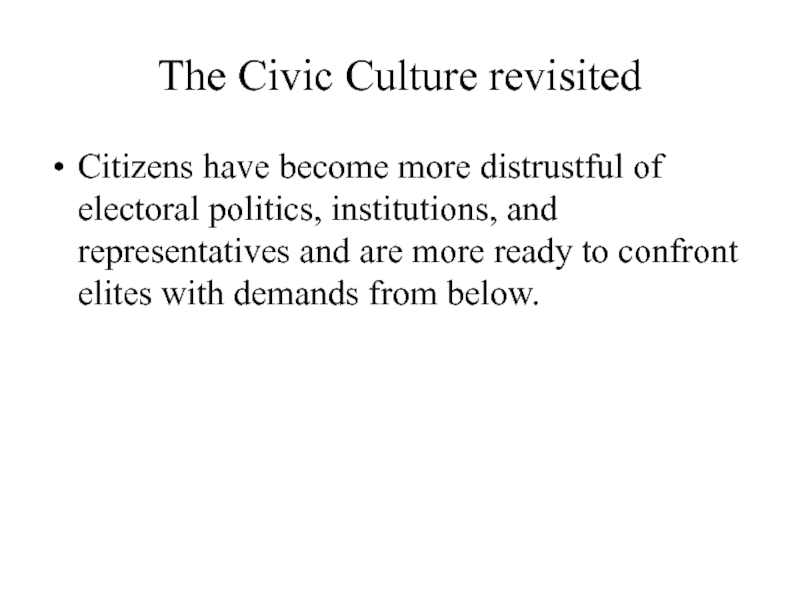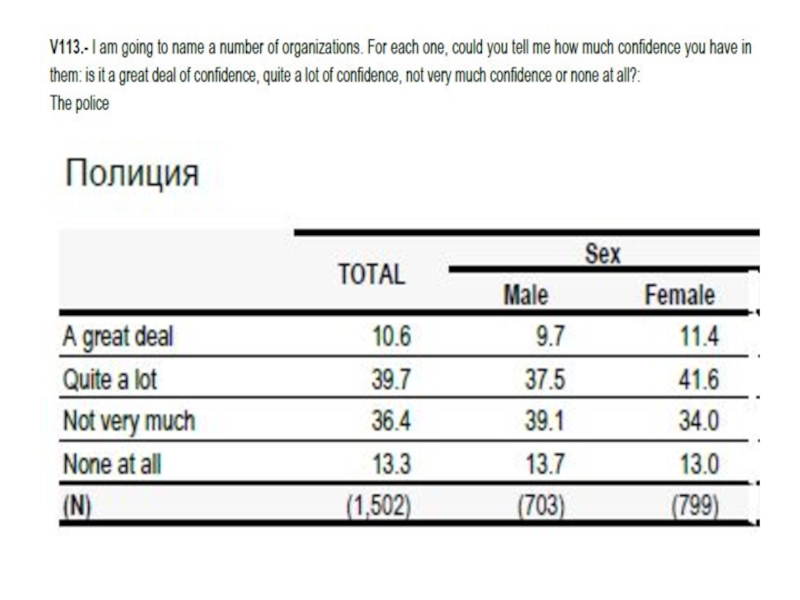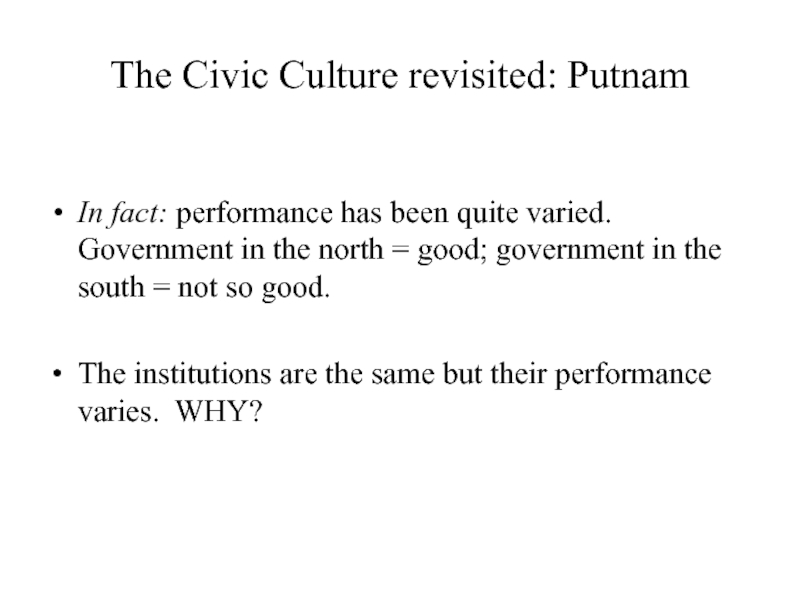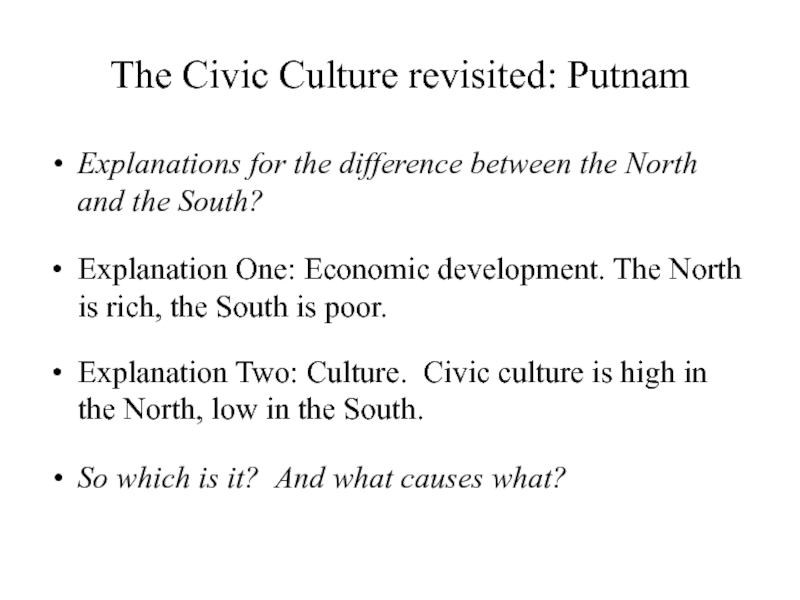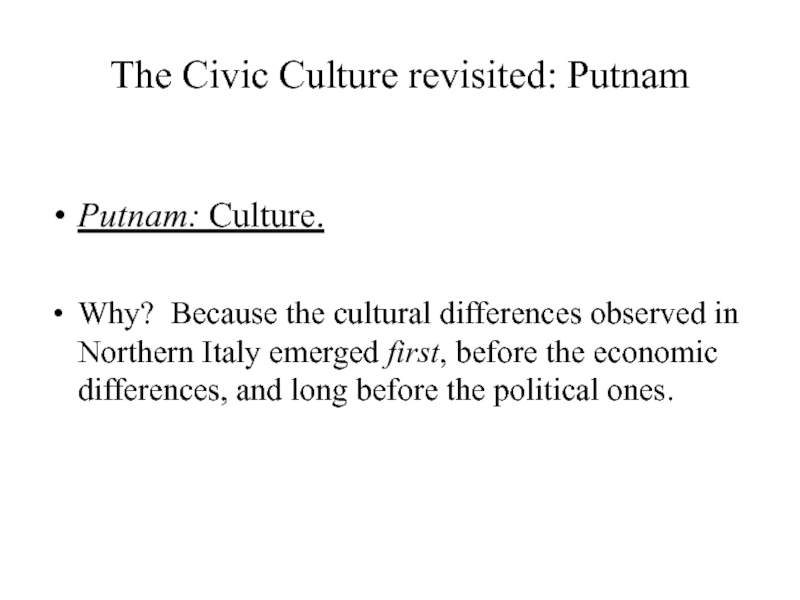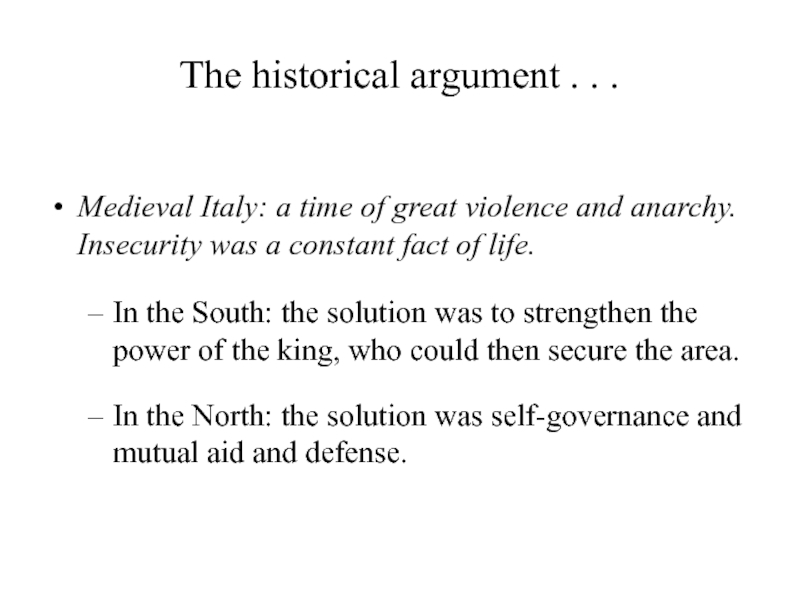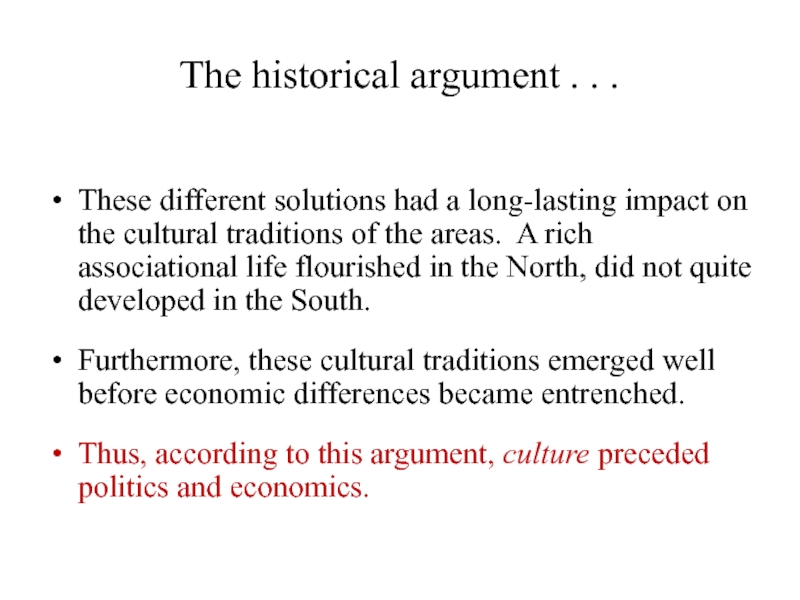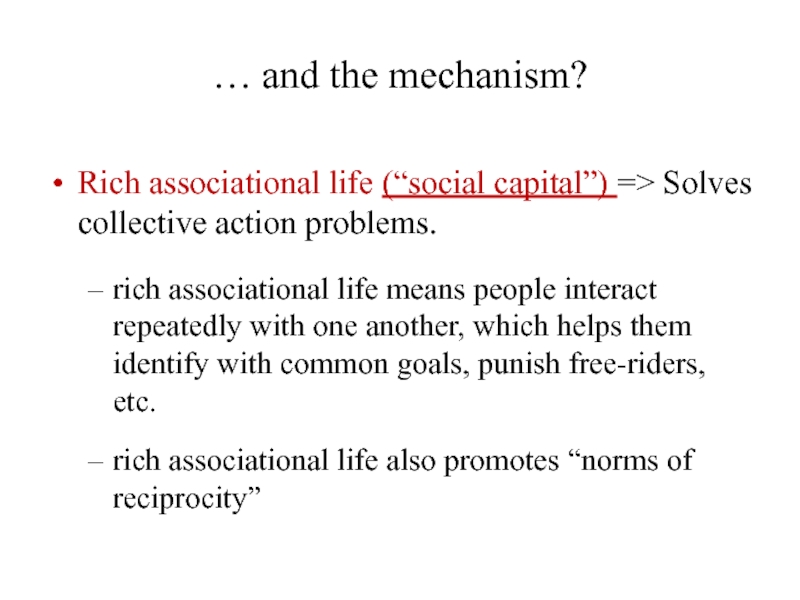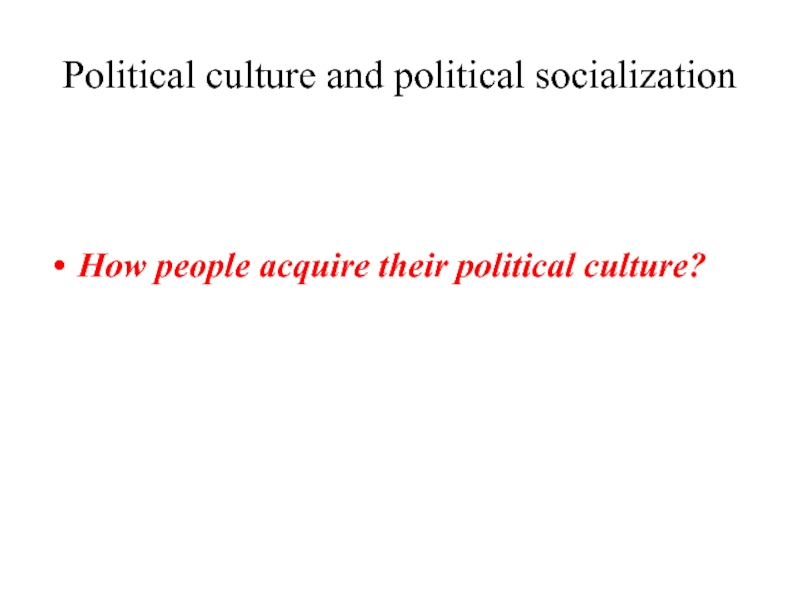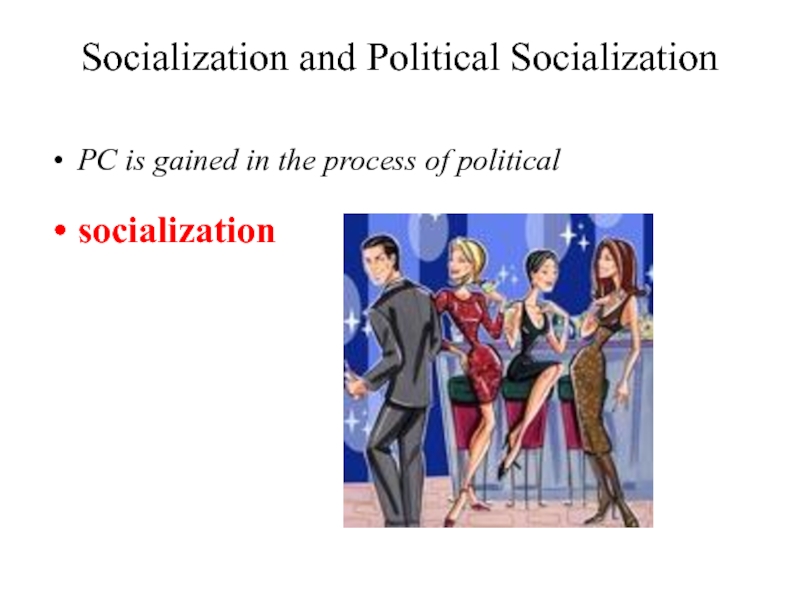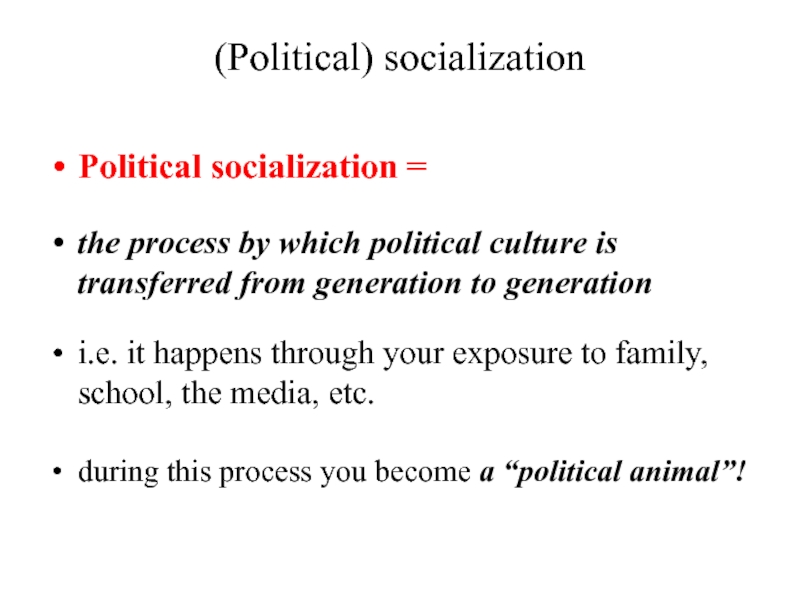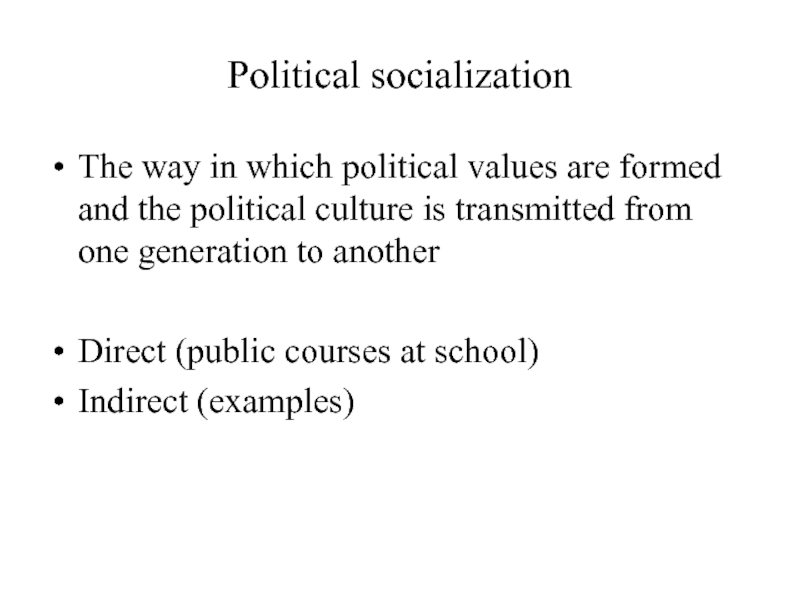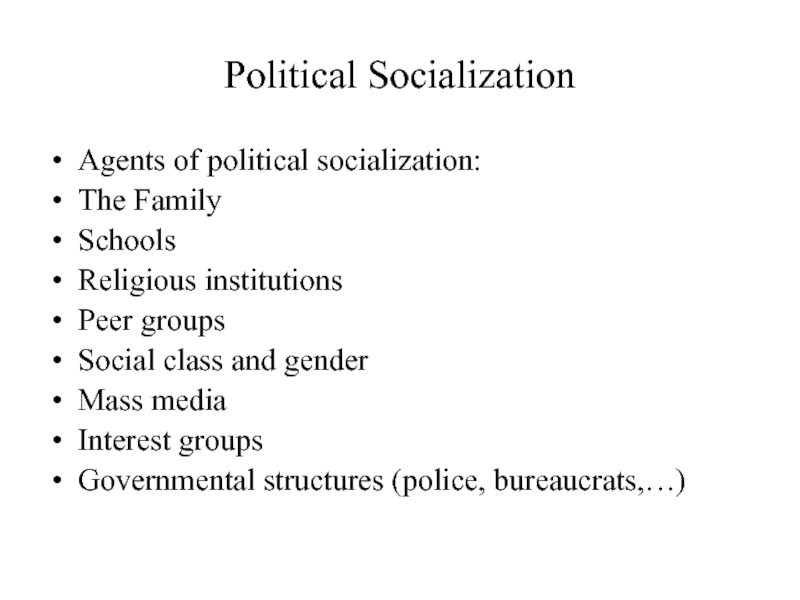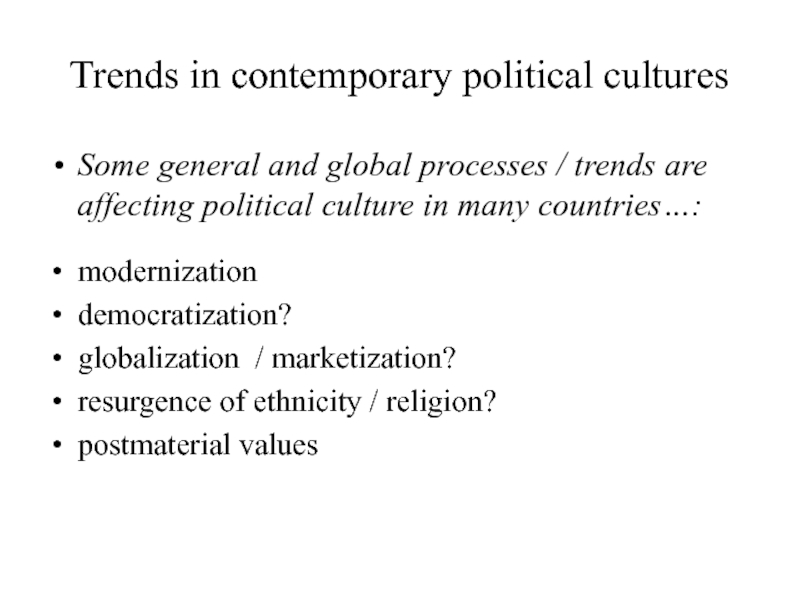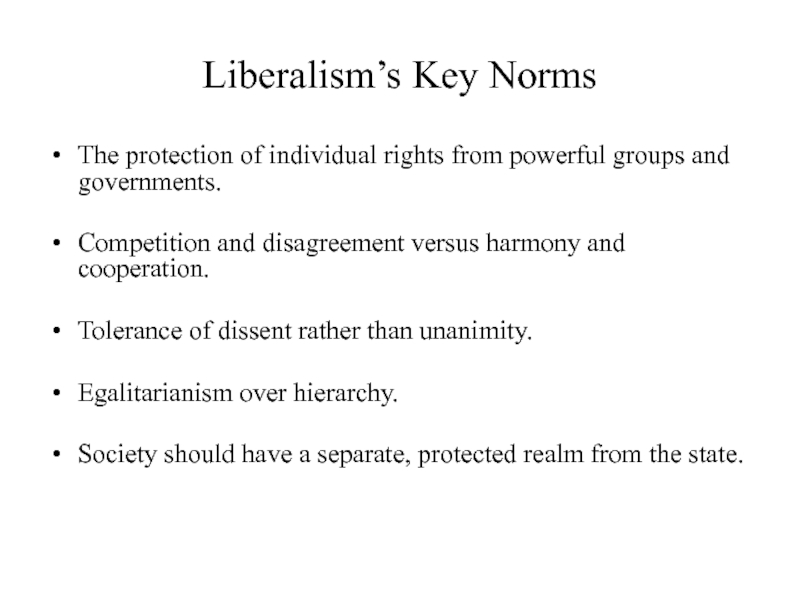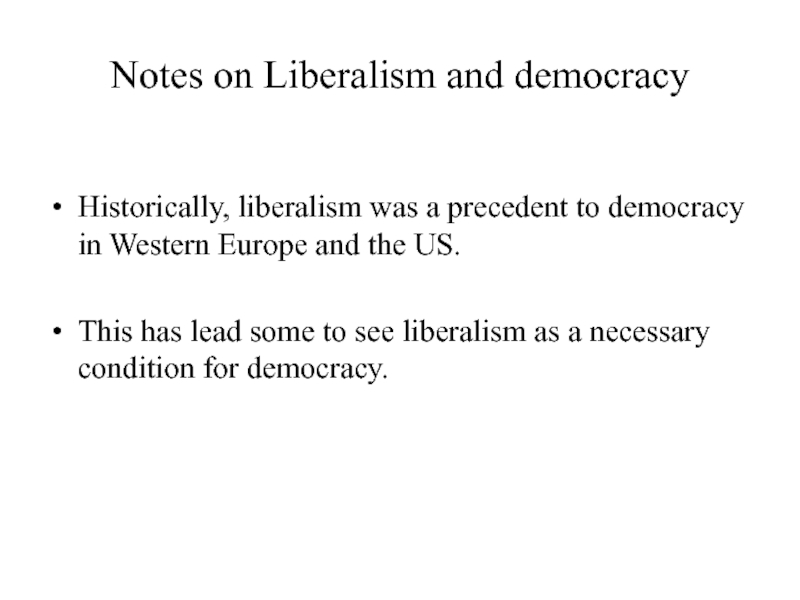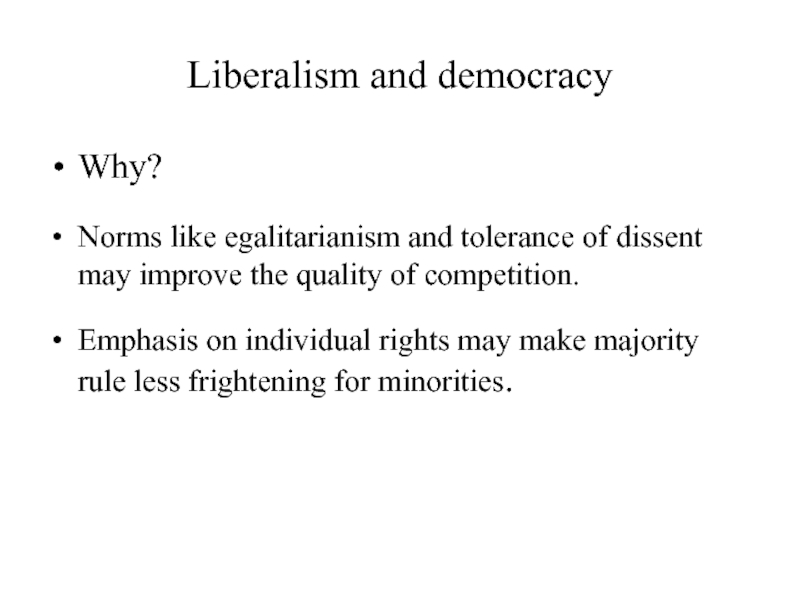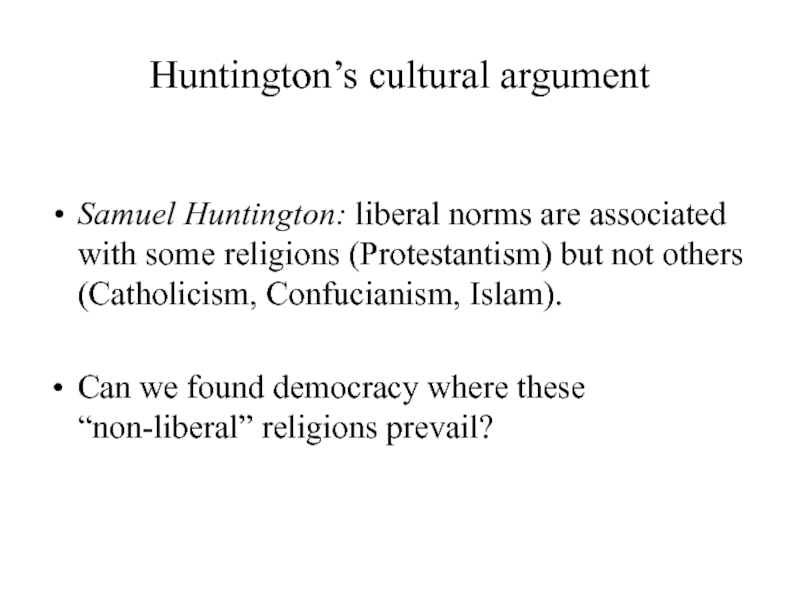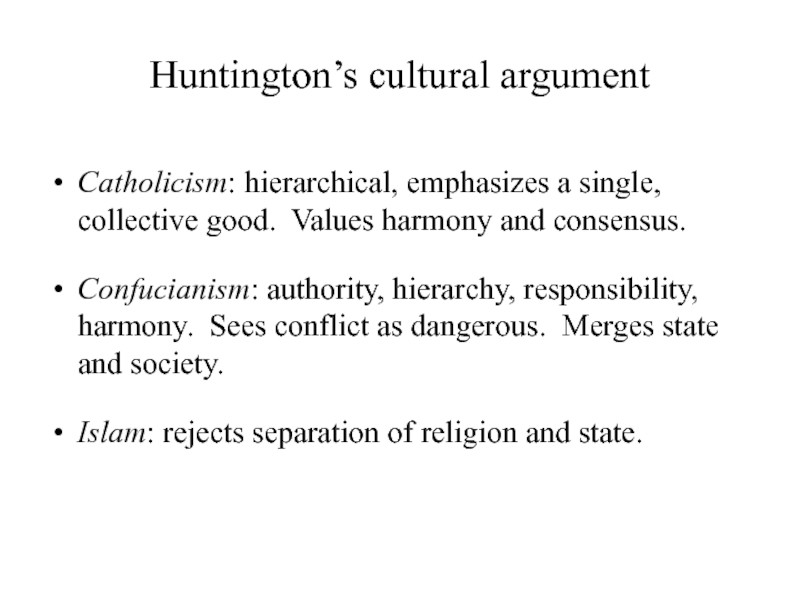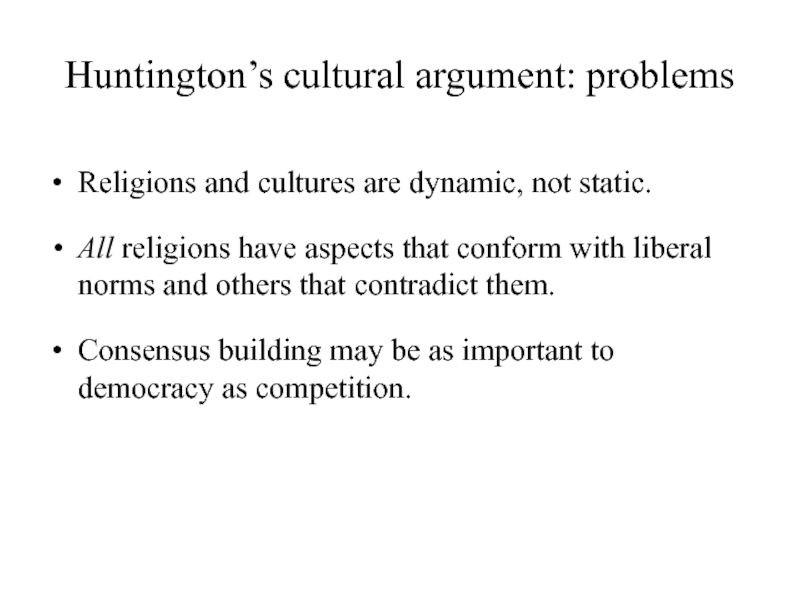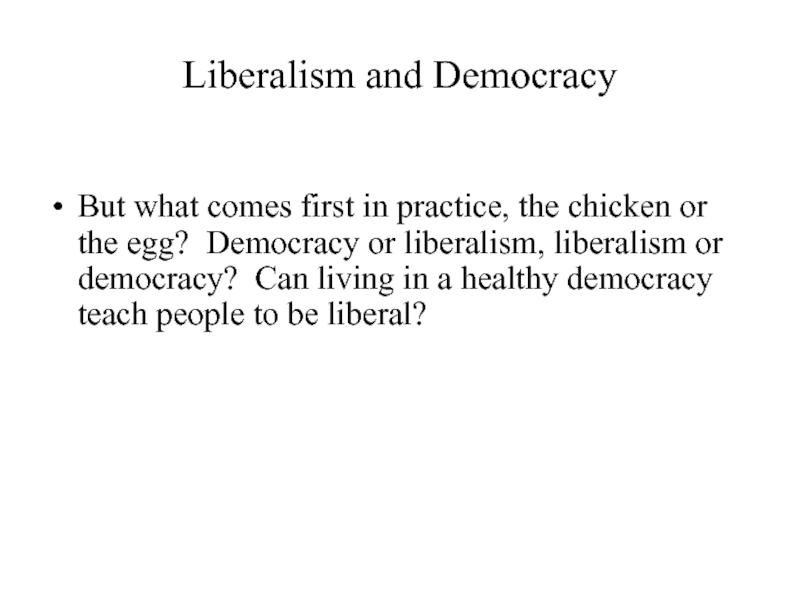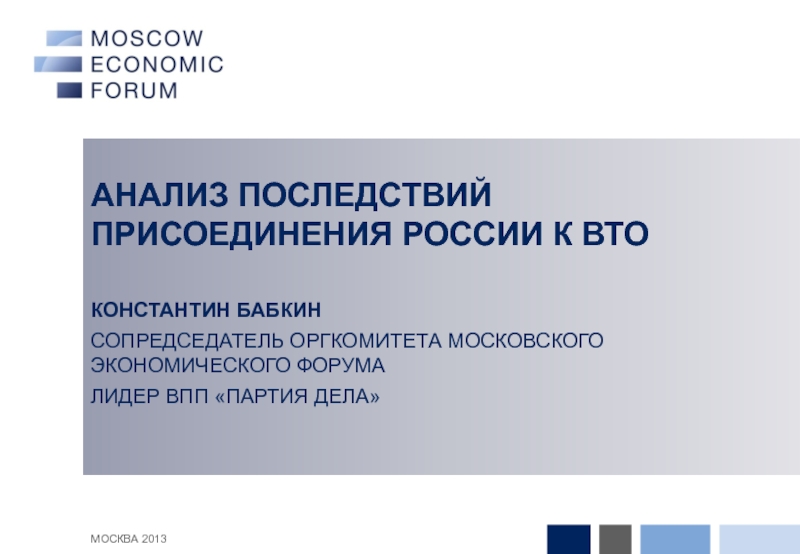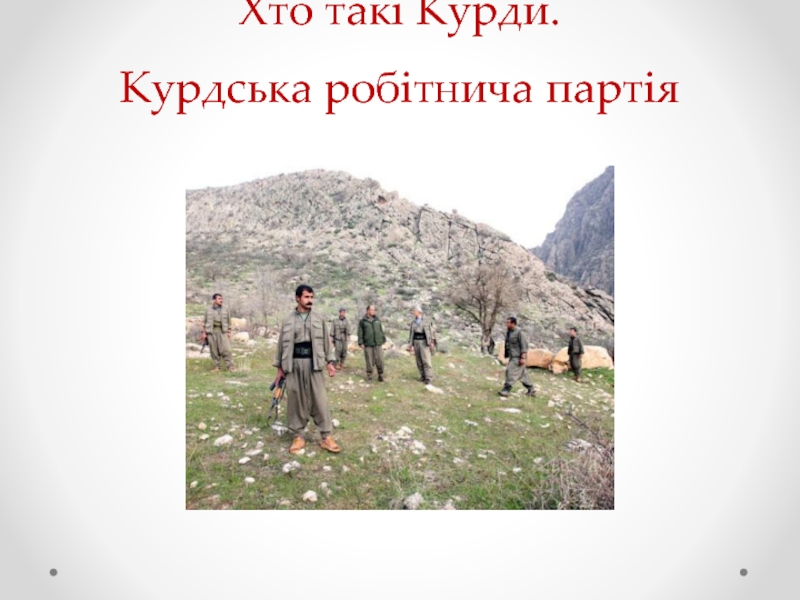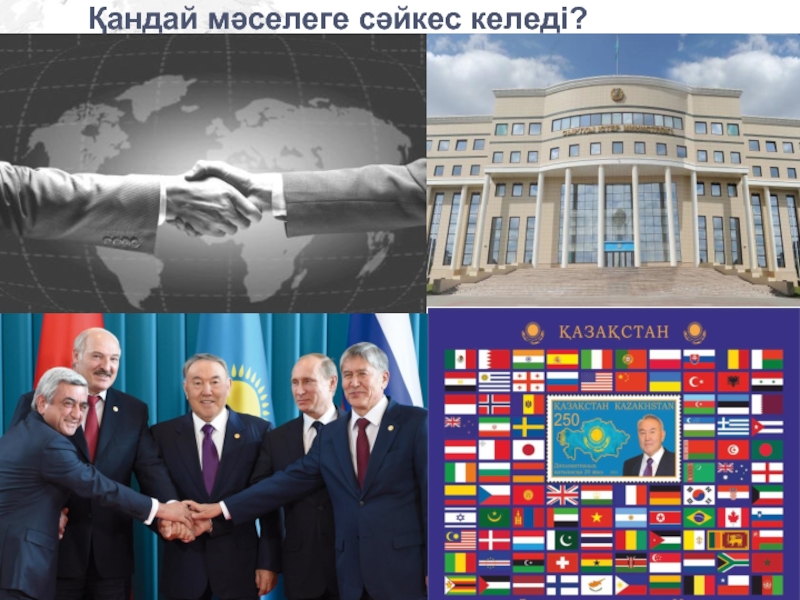- Главная
- Разное
- Дизайн
- Бизнес и предпринимательство
- Аналитика
- Образование
- Развлечения
- Красота и здоровье
- Финансы
- Государство
- Путешествия
- Спорт
- Недвижимость
- Армия
- Графика
- Культурология
- Еда и кулинария
- Лингвистика
- Английский язык
- Астрономия
- Алгебра
- Биология
- География
- Детские презентации
- Информатика
- История
- Литература
- Маркетинг
- Математика
- Медицина
- Менеджмент
- Музыка
- МХК
- Немецкий язык
- ОБЖ
- Обществознание
- Окружающий мир
- Педагогика
- Русский язык
- Технология
- Физика
- Философия
- Химия
- Шаблоны, картинки для презентаций
- Экология
- Экономика
- Юриспруденция
The variable of political culture & socialization презентация
Содержание
- 1. The variable of political culture & socialization
- 2. We will especially be interested in… How
- 3. Culture and Politics A thought experiment: if
- 4. Culture and Politics Classical political theorists starting
- 5. Culture and Politics Alexis de Tocqueville, Democracy
- 6. Political culture is? Political culture
- 7. Political culture is? Attitudes = dispositions
- 8. Political culture is? Norms: = values
- 9. Political culture is? a nation’s political
- 10. Political culture Other issues: government overall
- 11. Political culture Political culture (PC) PC
- 12. Political culture “shared” political culture in one
- 13. Political culture Observe also concepts /
- 14. Political culture Political culture / political subcultures
- 15. Political culture You may often hear
- 16. The Civic Culture: Almond &Verba Two components:
- 17. The Civic Culture: Almond &Verba
- 18. The Civic Culture: Almond &Verba In subject
- 19. The Civic Culture: Almond &Verba Hypothesis:
- 20. The Civic Culture: Almond &Verba Seminar Test:
- 21. The Civic Culture: Almond &Verba BUT: Couldn’t
- 22. The Civic Culture revisited: Putnam Robert Putnam,
- 23. The Civic Culture revisited Citizens have become
- 25. The Civic Culture revisited: Putnam In
- 26. The Civic Culture revisited: Putnam Explanations for
- 27. The Civic Culture revisited: Putnam Putnam:
- 28. The historical argument . . .
- 29. The historical argument . . .
- 30. … and the mechanism? Rich associational
- 31. Political culture and political socialization How people acquire their political culture?
- 32. Socialization and Political Socialization PC is gained
- 33. (Political) socialization Political socialization = the
- 34. Political socialization The way in which political
- 35. Political Socialization Agents of political socialization: The
- 36. Trends in contemporary political cultures Some general
- 37. Liberalism’s Key Norms The protection of individual
- 38. Notes on Liberalism and democracy Historically,
- 39. Liberalism and democracy Why? Norms like
- 40. Huntington’s cultural argument Samuel Huntington: liberal
- 41. Huntington’s cultural argument Catholicism: hierarchical, emphasizes
- 42. Huntington’s cultural argument: problems Religions and
- 43. Liberalism and Democracy But what comes
Слайд 2We will especially be interested in…
How do we explain democratic stability?
Why is democracy the “only game in town” in some countries but not others?
Different answers:
Level of economic development
Culture
Institutions
Different answers:
Level of economic development
Culture
Institutions
Слайд 3Culture and Politics
A thought experiment: if we took a political institution(s)
(e.g. democracy) indigenous to one country and transplanted it to another country with a completely different culture, would that institution /institutions perform the same way?
Does culture matter?
Does culture matter?
Слайд 4Culture and Politics
Classical political theorists starting with Plato and Aristotle and
continuing through Montesquieu, Rousseau, and Tocqueville all recognized the importance of custom, tradition, mores, and religious practices for explaining political differences. However, the formalizing of the concept of political culture had to await the developments after World War II…
Слайд 5Culture and Politics
Alexis de Tocqueville, Democracy in America
3 major causes of
democracy in America:
(1) geographical situation
(2) laws and institutions
(3) values, culture and what he called mores - “the whole moral and intellectual state of a people”
(1) geographical situation
(2) laws and institutions
(3) values, culture and what he called mores - “the whole moral and intellectual state of a people”
Слайд 6Political culture is?
Political culture
= the set of attitudes, beliefs, and
norms held by a population toward politics…
Слайд 7Political culture is?
Attitudes
= dispositions towards politics (political leaders, events, institutions, governments,
policies, etc.).
examples: support for the government, tolerance for opposing view points, trust in political institutions, feelings of political efficacy and so on.
examples: support for the government, tolerance for opposing view points, trust in political institutions, feelings of political efficacy and so on.
Слайд 8Political culture is?
Norms:
= values / ideas about the world / judgments
about what is good and bad…
Example: “Democracy is good”; “justice is the most important thing”, etc.
Example: “Democracy is good”; “justice is the most important thing”, etc.
Слайд 9Political culture is?
a nation’s political culture includes its citizens orientation toward
3 levels:
the political system
its individual institutions and the political and policy-making process
policy outputs and outcomes
the political system
its individual institutions and the political and policy-making process
policy outputs and outcomes
Слайд 10Political culture
Other issues:
government overall involvement in society and economy
‘big government’ or
‘small government’?
nationalization or privatization?
from basic needs to quality of life (environment, arts, etc.)
nationalization or privatization?
from basic needs to quality of life (environment, arts, etc.)
Слайд 11Political culture
Political culture (PC)
PC affects / has influence on: how the
political system and institutions evolve, how political decisions are made, etc.
How much does PC have impact on institutional structures in political system &decision-making processes?
PC = a longer-term factor
How much does PC have impact on institutional structures in political system &decision-making processes?
PC = a longer-term factor
Слайд 12Political culture
“shared” political culture in one country does not mean that
people have identical positions/ opinions on all issues…; we can, for instance, distinguish between
“mass” vs. “elite” political cultures
they might be different within one country and could be seen as different “sub-cultures”
there might also be regional subcultures and subcultures associated with larger groups /classes
“mass” vs. “elite” political cultures
they might be different within one country and could be seen as different “sub-cultures”
there might also be regional subcultures and subcultures associated with larger groups /classes
Слайд 13Political culture
Observe also concepts / values such as:
national identity
national pride /
patriotism
nationalism
National vs. regional / local identities
nationalism
National vs. regional / local identities
Слайд 14Political culture
Political culture / political subcultures
Consensual
Conflictual
sometimes can coincide with religious, ethnic
differences
Слайд 15Political culture
You may often hear that democracy cannot succeed in some
countries because of their “undemocratic political culture”…
civic culture = PC that supports liberalism and democracy (G. Almond & S. Verba)
perhaps a balanced mix of participant and subject political cultures
civic culture = PC that supports liberalism and democracy (G. Almond & S. Verba)
perhaps a balanced mix of participant and subject political cultures
Слайд 16The Civic Culture: Almond &Verba
Two components:
A participant attitude toward politics. Individuals
value participation and become involved in their communities (not just their own narrow self interest)
Trust in other people and a willingness to cooperate
Trust in other people and a willingness to cooperate
Слайд 18The Civic Culture: Almond &Verba
In subject or parochial political culture (also
“familism)”:
all loyalty and trust is centered in the family.
people are not public-spirited: they don’t participate in community life, are not informed about politics, etc.
no trust of “outsiders,” no willingness to cooperate.
maximize material, short-run advantage of family
all loyalty and trust is centered in the family.
people are not public-spirited: they don’t participate in community life, are not informed about politics, etc.
no trust of “outsiders,” no willingness to cooperate.
maximize material, short-run advantage of family
Слайд 19The Civic Culture: Almond &Verba
Hypothesis:
Civic Culture => Stable Democracy
=
in stable political systems political structures and political culture are mutually reinforcing
Other PC / Familism => Unstable Democracy
Other PC / Familism => Unstable Democracy
Слайд 20The Civic Culture: Almond &Verba
Seminar Test:
Measure civic culture in 5
countries that vary in their level of democratic stability:
High stability: US, GB
Middle stability: Italy
Low stability: Mexico, Pakistan
Prediction: Civic culture is high in US and GB, low in Mexico and Pakistan, moderate in Italy.
Results: Hypothesis confirmed.
Conclusion: Cultural attitudes => Stability of democracy.
High stability: US, GB
Middle stability: Italy
Low stability: Mexico, Pakistan
Prediction: Civic culture is high in US and GB, low in Mexico and Pakistan, moderate in Italy.
Results: Hypothesis confirmed.
Conclusion: Cultural attitudes => Stability of democracy.
Слайд 21The Civic Culture: Almond &Verba
BUT: Couldn’t the relationship run the other
way? Perhaps high levels of civic culture are an effect of stable institutions, not their cause!
AND: Perhaps both cultural values and democratic stability are caused by something else, namely, economic development?
(In general: correlation is not the same as causation!!!)
AND: Perhaps both cultural values and democratic stability are caused by something else, namely, economic development?
(In general: correlation is not the same as causation!!!)
Слайд 22The Civic Culture revisited: Putnam
Robert Putnam, Making Democracy Work: Civic Traditions
in Modern Italy
Why does democracy work well in some places but not others?
The Italian experiment: 15 identical regional governments situated in different economic and cultural contexts. Would they perform differently? If so, why?
Why does democracy work well in some places but not others?
The Italian experiment: 15 identical regional governments situated in different economic and cultural contexts. Would they perform differently? If so, why?
Слайд 23The Civic Culture revisited
Citizens have become more distrustful of electoral politics,
institutions, and representatives and are more ready to confront elites with demands from below.
Слайд 25The Civic Culture revisited: Putnam
In fact: performance has been quite varied.
Government in the north = good; government in the south = not so good.
The institutions are the same but their performance varies. WHY?
The institutions are the same but their performance varies. WHY?
Слайд 26The Civic Culture revisited: Putnam
Explanations for the difference between the North
and the South?
Explanation One: Economic development. The North is rich, the South is poor.
Explanation Two: Culture. Civic culture is high in the North, low in the South.
So which is it? And what causes what?
Explanation One: Economic development. The North is rich, the South is poor.
Explanation Two: Culture. Civic culture is high in the North, low in the South.
So which is it? And what causes what?
Слайд 27The Civic Culture revisited: Putnam
Putnam: Culture.
Why? Because the cultural differences
observed in Northern Italy emerged first, before the economic differences, and long before the political ones.
Слайд 28The historical argument . . .
Medieval Italy: a time of great
violence and anarchy. Insecurity was a constant fact of life.
In the South: the solution was to strengthen the power of the king, who could then secure the area.
In the North: the solution was self-governance and mutual aid and defense.
In the South: the solution was to strengthen the power of the king, who could then secure the area.
In the North: the solution was self-governance and mutual aid and defense.
Слайд 29The historical argument . . .
These different solutions had a long-lasting
impact on the cultural traditions of the areas. A rich associational life flourished in the North, did not quite developed in the South.
Furthermore, these cultural traditions emerged well before economic differences became entrenched.
Thus, according to this argument, culture preceded politics and economics.
Furthermore, these cultural traditions emerged well before economic differences became entrenched.
Thus, according to this argument, culture preceded politics and economics.
Слайд 30… and the mechanism?
Rich associational life (“social capital”) => Solves collective
action problems.
rich associational life means people interact repeatedly with one another, which helps them identify with common goals, punish free-riders, etc.
rich associational life also promotes “norms of reciprocity”
rich associational life means people interact repeatedly with one another, which helps them identify with common goals, punish free-riders, etc.
rich associational life also promotes “norms of reciprocity”
Слайд 32Socialization and Political Socialization
PC is gained in the process of political
socialization
Слайд 33(Political) socialization
Political socialization =
the process by which political culture is transferred
from generation to generation
i.e. it happens through your exposure to family, school, the media, etc.
during this process you become a “political animal”!
i.e. it happens through your exposure to family, school, the media, etc.
during this process you become a “political animal”!
Слайд 34Political socialization
The way in which political values are formed and the
political culture is transmitted from one generation to another
Direct (public courses at school)
Indirect (examples)
Direct (public courses at school)
Indirect (examples)
Слайд 35Political Socialization
Agents of political socialization:
The Family
Schools
Religious institutions
Peer groups
Social class and gender
Mass
media
Interest groups
Governmental structures (police, bureaucrats,…)
Interest groups
Governmental structures (police, bureaucrats,…)
Слайд 36Trends in contemporary political cultures
Some general and global processes / trends
are affecting political culture in many countries…:
modernization
democratization?
globalization / marketization?
resurgence of ethnicity / religion?
postmaterial values
modernization
democratization?
globalization / marketization?
resurgence of ethnicity / religion?
postmaterial values
Слайд 37Liberalism’s Key Norms
The protection of individual rights from powerful groups and
governments.
Competition and disagreement versus harmony and cooperation.
Tolerance of dissent rather than unanimity.
Egalitarianism over hierarchy.
Society should have a separate, protected realm from the state.
Competition and disagreement versus harmony and cooperation.
Tolerance of dissent rather than unanimity.
Egalitarianism over hierarchy.
Society should have a separate, protected realm from the state.
Слайд 38Notes on Liberalism and democracy
Historically, liberalism was a precedent to democracy
in Western Europe and the US.
This has lead some to see liberalism as a necessary condition for democracy.
This has lead some to see liberalism as a necessary condition for democracy.
Слайд 39Liberalism and democracy
Why?
Norms like egalitarianism and tolerance of dissent may improve
the quality of competition.
Emphasis on individual rights may make majority rule less frightening for minorities.
Emphasis on individual rights may make majority rule less frightening for minorities.
Слайд 40Huntington’s cultural argument
Samuel Huntington: liberal norms are associated with some religions
(Protestantism) but not others (Catholicism, Confucianism, Islam).
Can we found democracy where these “non-liberal” religions prevail?
Can we found democracy where these “non-liberal” religions prevail?
Слайд 41Huntington’s cultural argument
Catholicism: hierarchical, emphasizes a single, collective good. Values harmony
and consensus.
Confucianism: authority, hierarchy, responsibility, harmony. Sees conflict as dangerous. Merges state and society.
Islam: rejects separation of religion and state.
Confucianism: authority, hierarchy, responsibility, harmony. Sees conflict as dangerous. Merges state and society.
Islam: rejects separation of religion and state.
Слайд 42Huntington’s cultural argument: problems
Religions and cultures are dynamic, not static.
All
religions have aspects that conform with liberal norms and others that contradict them.
Consensus building may be as important to democracy as competition.
Consensus building may be as important to democracy as competition.
Слайд 43Liberalism and Democracy
But what comes first in practice, the chicken or
the egg? Democracy or liberalism, liberalism or democracy? Can living in a healthy democracy teach people to be liberal?
